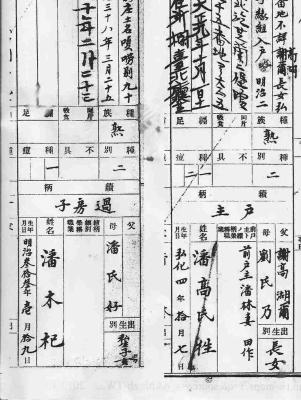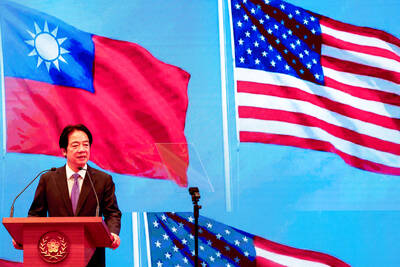Yesterday would have been the 26th birthdays of two twin girls, if they were still alive. They were brutally murdered along with their grandmother on Feb. 28, 1980.
The case that has come to be known as the "Lin Family Murders?(林宅血案) will officially close on the 28th of this month with no assassin apprehended and the motives still officially unknown.
But the father of the children, DPP chairperson Lin I-hsiung (林義雄), like many other Taiwanese, is certain that the motives were political.
Lin I-hsiung's mother and twin daughters were killed when he was in jail 20 years ago, after having been arrested on Dec. 13, 1979 for his participation in a human rights rally in Kaohsiung three days earlier.
The march, in central Kaohsiung, was organized by staff members of Formosa magazine (美麗島), which had begun publication four months earlier. Pitched battles with police during the march left dozens of people injured.
The event came to be known as the Kaohsiung Incident (美麗島事件). Some 45 Formosa activists were arrested, and eight opposition leaders were eventually charged with sedition.
Shih Min-teh (施明德) received a life sentence, and the rest, including Lin, received jail sentences of 12-14 years.
It was only a day after Lin's wife and mother were allowed their first jail visit in the 87 days since his arrest when the murder took place.
On Feb. 28, 1980, a man dressed in black came to Lin's home to murder his children and mother.
The crime, which coincided with the anniversary of the 2-28 Incident (二二八事件), in which Taiwanese rebelling against KMT rule were massacred, rocked the nation.
Lin's wife, Fang Su-min (方素敏), was attending the the first public investigatory hearing of the Kaohsung Incident when the murders took place. Lin's 60-year-old mother, Lin Yu Ah-mai (林游阿妹), and the six-year-old twin girls were brutally murdered, according to police reports. Nine-year-old Huan-chun (奐均) survived with severe injuries.
"They were stabbed to death at midday in their own home, under the guard of the security agency. Such a thing would never have been happened in another country in the 20th centry"Ken Chiu (邱晃泉), a human rights lawyer, said.
The girls and their grandmother were not buried until Lin was released from jail in 1985. Fang and surviving daughter Lin Huan-chun moved to the US to start a new life.
"I don't know ever if he [the murderer] is alive now," says Fang Su-min. But I don't hate him, because love is our best weapon.
In heaven
"When I think of them, my for-ever seven-year-old little girls,"says Lin, who counts their ages Taiwanese style, "instead of recalling how they were taken away from us, I've often thought about where they are now - in heaven.
Lin, who seldom talks about his feelings in public, says he sometimes hears the twins calling for him and wife to join them in heaven.
"Is it heavenly down there, too?” they ask.
He says his reply is: "No, no, not exactly, but we are trying, trying to make it heavenly." Trying "to make the world more heavenly"is the reason Lin and his wife, despite all they have been through, have returned to politics.
For Fang Su-min, it's a simple question of preventing a "third" 2-28 incident from taking place. And she's also clear that her transition from housewife to legislator in 1983 had nothing to do with vengeance.
"I did not have vengeance in my mind ... All I wanted was to speak out and make things clear, hoping that the same tragedy won't repeat itself and the sacrifice of my loved ones won't be for nothing," Fang says.
After helping her daughter settle down in the US, Fang returned to Taiwan and ran in the 1983 Legislative Yuan elections. "Everybody assumed that I was running on behalf of my husband (代夫出征) like other wives whose husbands were arrested in the Kaohsiung Incident," she says.
"I was the only one who knew for whom I was standing - my twin daughters and mother,"she says.
Fang ran an emotional campaign in which, in tears, she often explained to audiences what had happened to her family and how she hoped such a thing would never happen again.
It was a political campaign that came to be known as the “holy war of the mother."
Heartfelt letter
"Dear Liang-chun (亮均) and Ting-chun (亭均),"she wrote in a letter to her twin daughters on the eve of what would have been their 26th birthday.
"It has been twenty years since you left. Do you know that your sister Huan-chun is expecting her first baby this spring and that you two will become aunties soon? I have often remembered the way three-year-old Huan-chun held a bottle and tried to help me feed you two when you were still babies. If you were still with us today, would you return the favor by feeding Huan-chun's baby?" Fang wondered, during a memorial birthday party yesterday, what the twins would have looked like now.
"Would you still have kept that straight long hair and fringe covering your forehead?"she wondered. "Would you have been as brilliant a pianist as Huan-chun is? Would you two still be hanging about inseparably like always, or would you have separately fallen in love, enjoying the greatest gift that life gives you?" Two years ago, when Huan-chun needed a wedding gown for her engagement party but couldn't find anything she liked, Fang rummaged through some long- sealed clothing cases and found her own wedding gown - the one that she wore almost 30 years ago.
Surprisingly, it suited Huan-chun perfectly.
Looking at Huan-chun in her wedding gown made Fang ponder what she would have done if her other two daughters wanted to get married on the same day and both needed her wedding gown at the same time.
Photo album
Lin used to sort, clip and paste all three daughters?photographs on New Year's Eve every year, and try to make a family photo album for each of them as dowries. Huan-chun's has gone with her to her new family. But he has been unable to look at the ones he compiled for his twin daughters since they were killed.
"In the past 20 years, their father has never once brought himself to look at the photo albums again,"Fang says, looking at the faded yellow photographs and admitting that it was only recently that she herself could bear to look again the photos that traced the twins' lives from the day they were born to the day they celebrated their 6th birthday.
A set of twins, seven-year-old Liu Laing-chun (劉亮均) and Liu Ting-chun (劉亭均), named after Lin and Fang's girls, blew out the candles on a birthday cake in honor of the deceased twins during a memorial service at the Taipei 228 Memorial Museum yesterday.
There wasn't a dry eye in the room.

Feb. 9 to Feb.15 Growing up in the 1980s, Pan Wen-li (潘文立) was repeatedly told in elementary school that his family could not have originated in Taipei. At the time, there was a lack of understanding of Pingpu (plains Indigenous) peoples, who had mostly assimilated to Han-Taiwanese society and had no official recognition. Students were required to list their ancestral homes then, and when Pan wrote “Taipei,” his teacher rejected it as impossible. His father, an elder of the Ketagalan-founded Independence Presbyterian Church in Xinbeitou (自立長老會新北投教會), insisted that their family had always lived in the area. But under postwar

On paper, the Democratic Progressive Party (DPP) enters this year’s nine-in-one elections with almost nowhere to go but up. Yet, there are fears in the pan-green camp that they may not do much better then they did in 2022. Though the DPP did somewhat better at the city and county councillor level in 2022, at the “big six” municipality mayoral and county commissioner level, it was a disaster for the party. Then-president and party chairwoman Tsai Ing-wen (蔡英文) made a string of serious strategic miscalculations that led to the party’s worst-ever result at the top executive level. That year, the party

In 2012, the US Department of Justice (DOJ) heroically seized residences belonging to the family of former president Chen Shui-bian (陳水扁), “purchased with the proceeds of alleged bribes,” the DOJ announcement said. “Alleged” was enough. Strangely, the DOJ remains unmoved by the any of the extensive illegality of the two Leninist authoritarian parties that held power in the People’s Republic of China (PRC) and Taiwan. If only Chen had run a one-party state that imprisoned, tortured and murdered its opponents, his property would have been completely safe from DOJ action. I must also note two things in the interests of completeness.

As much as I’m a mountain person, I have to admit that the ocean has a singular power to clear my head. The rhythmic push and pull of the waves is profoundly restorative. I’ve found that fixing my gaze on the horizon quickly shifts my mental gearbox into neutral. I’m not alone in savoring this kind of natural therapy, of course. Several locations along Taiwan’s coast — Shalun Beach (沙崙海水浴場) near Tamsui and Cisingtan (七星潭) in Hualien are two of the most famous — regularly draw crowds of sightseers. If you want to contemplate the vastness of the ocean in true